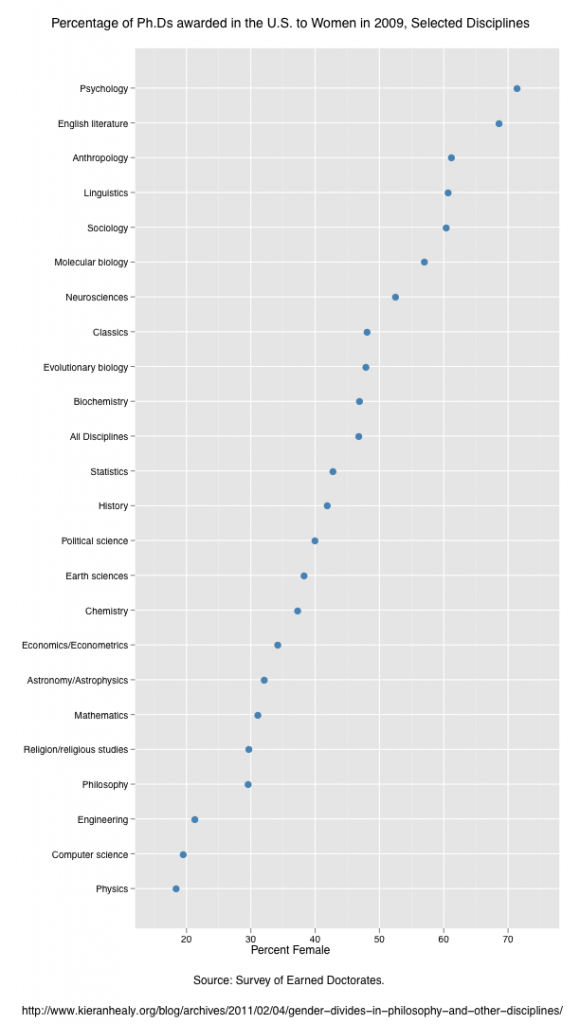This article is excerpted from the book Enemies: A History of the FBI by Tim Weiner
Category: USH: Justice Movements of the 60s and 70s
% of PhDs awarded to women in 2009

The End of Men?
Earlier this year, women became the majority of the workforce for the first time in U.S. history. Most managers are now women too. And for every two men who get a college degree this year, three women will do the same. For years, women’s progress has been cast as a struggle for equality. But what if equality isn’t the end point? What if modern, postindustrial society is simply better suited to women? A report on the unprecedented role reversal now under way— and its vast cultural consequences.
Hanna Rosin offers some paradigm shaking evidence in this piece from The Atlantic.
Note: it might be best to disregard the headline grabbing title of this article. Silly antics.
Video Doc: The Weather Underground
A group of young American radicals announced their intention to overthrow the U.S. government. In ‘The Weather Underground’, former Underground members, including Bernardine Dohrn, Bill Ayers, Mark Rudd, David Gilbert and Brian Flanagan, speak publicly about the idealistic passion that drove them to “bring the war home” and the trajectory that placed them on the FBI’s most wanted list. Fueled by outrage over racism and the Vietnam War, the Weather Underground waged a low-level war against the U.S. government through much of the 1970s–bombing targets across the country that they considered emblematic of the real violence that the U.S. was wreaking throughout the world. Ultimately, the group’s carefully organized clandestine network managed to successfully evade one of the largest manhunts in FBI history, yet the group’s members would reemerge to life in a country that was dramatically different than the one they had hoped their efforts would inspire. Extensive archival material, including, photographs, film footage and FBI documents are interwoven with modern-day interviews to trace the group’s path, from its pitched battles with police on Chicago’s streets, to its bombing of the U.S. Capitol, to its successful endeavor breaking acid-guru Timothy Leary out of prison. The film explores the Weathermen in the context of other social movements of the time and features interviews with former members of the Students for a Democratic Society (SDS) and the Black Panthers. It also examines the U.S. government’s suppression of dissent in the 1960s and 1970s. Looking back at their years underground, the former members paint a compelling portrait of troubled times, revolutionary times, and the forces that drove their resistance.
A well-constructed and reasonably well-rounded documentary about the Underground
Opposing Perspectives on Civil Disobedience
Howard Zinn’s essay, The Problem is Civil Obedience
Erwin Canham’s essay, How Civil Disobedience Erodes the Structure of Society
1. Summarize the thesis of each author in your own words
2. Discuss the argumentation of each author
3. Offer 1-2 quotes which exemplify the strength of the author’s position. Explain why this is a strong argument.
4. Offer 1-2 quotes which exemplify the weaknesses of the author’s position. Explain why this is a weak argument.
5. Offer one question you would like to ask the author.
Again, do this for each document (so 10 questions total)
Political History Gets Animated in 'Chicago 10'
Director Brett Morgen joins Fresh Air‘s Terry Gross to discuss his new film, Chicago 10. Morgen uses archival footage and animation techniques to tell the story of the anti-war activists known as “the Chicago 8” a misnomer, he says, and one he corrects in his film title. Outside the 1968 Democratic Convention in Chicago, protesters rallied to show disapproval of the Vietnam War. They hadn’t been granted demonstration permits, however, and for a week, they were involved in violent conflict with Chicago police.
Less than a year later, eight of the protest leaders the so-called Chicago 8 were indited by a federal grand jury on counts of, among other things, conspiracy and incitement to riot. All were eventually found not guilty on conspiracy, but five were found guilty of violating the 1968 Anti-Riot Act. In 1972, those convictions were reversed.
Challenged by a lack of courtroom footage, and inspired by a quote from lawyer Jerry Rubin that described the proceedings as “a cartoon show,” Morgen chose motion-caption animation (most famously used in such films as The Polar Express ) to re-create the trial. Voices are supplied by actors including Liev Schreiber, Mark Ruffalo, Dylan Baker, Hank Azaria, Nick Nolte, Jeffrey Wright and Roy Scheider.